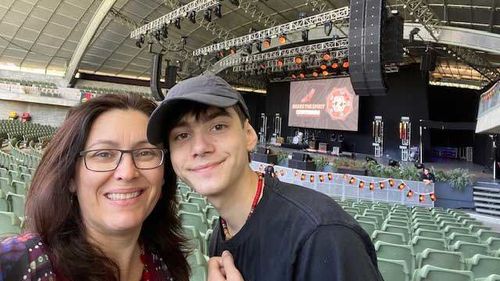New black box warning for popular children’s asthma medication linked to reports of suicide

[ad_1]
A new black box warning will be added to an asthma drug that has been linked to reports of three suicides in Australia in the past year.
The decision comes after more than a decade of lobbying by families about the dangerous potential side effects of the drug montelukast, sold as Singulair.
The medicine comes in chewable tablets and is usually prescribed to children, but adults can also use it.
Some parents said their children suffered severe side effects while taking the drug, including nightmares, behavioral changes and, in rare cases, suicidal thoughts.

The decision follows similar moves overseas, where a black box warning has been added to products containing montelukast in the US, Canada and Europe.
In its statement from the meeting, the ACM said evidence on the potential link between montelukast and neuropsychiatric risks remained uncertain, but a black box warning would “bring Australia into line with international regulators” and “validate consumer concerns”.
The US Food and Drug Administration has since released initial findings from internal research it conducted on the effects of montelukast.
The results, presented at an American College of Toxicology conference last month, have yet to be peer-reviewed, but show that montelukast binds to multiple brain receptors critical to psychiatric functioning.
Anyone – including patients, doctors or family members – can report an adverse event. The reports have not been confirmed by the TGA and do not prove a causal relationship between the drug and the side effect.
In the cases of all three people who took their own lives, montelukast was the only drug they were known to have taken.
Back in 2018, following a series of articles published by 9news.com.au which told the stories of children and adults suffering from nightmares and suicidal ideation while taking the drug, the TGA announced that information about possible neuropsychiatric side effects of montelukast will be added to product information inside the box.
Vanessa Selick is a Melbourne mum who has been campaigning for warning labels on medicine packaging for 11 and a half years.
Selick said the new black box warning was another step in the right direction, but the announcement had “mixed emotions.”
“We’re excited about this progress but, on the other hand, we know that there are three additional montelukast-induced suicides in Australia this year and that’s hard to accept,” she said.
“We’ve been advocating for 11 and a half years and we still have people dying from this drug.”
Selick’s son, Harrison, now 19, started taking Singulair at age two.
He would have severe outbursts that would last for hours, and when he was just four years old, he began to have suicidal thoughts, she said.
Selick said her son was in the bathtub one day when he began begging her to kill him in graphic detail. At the age of five, he made an attempt on his own life.

As a young man, Harrison still suffered from the effects of the drug, Selick said.
“One of the recognized side effects of (montelukast) is obsessive-compulsive disorder, and that’s probably going to be Harrison’s biggest struggle,” Selick said.
“His OCD makes it difficult for him to function every day. He still experiences anxiety and suffers bouts of depression.’
Selick, who runs a patient advocacy group for people affected by montelukast along with another parent, Jocelyn Suter, said more needs to be done to stop others from suffering.
“What we want now is actually a fluorescent sticker on the outside of the package, which is called a warning label,” Selick said.
While warning labels on the outside of the package can be found for some drugs in Australia, such as those not to be taken when operating heavy machinery, there are currently none for drugs linked to neuropsychiatric side effects, Sellick said.
Sellick and Suiter’s group is working with the Pharmaceutical Society of Australia and the TGA, who have started a consultation process on a recommended label warning for montelukast.
Readers seeking support can get in touch Lifeline on 13 11 14 or Beyond the blue on 1300 22 4636.
[ad_2]




